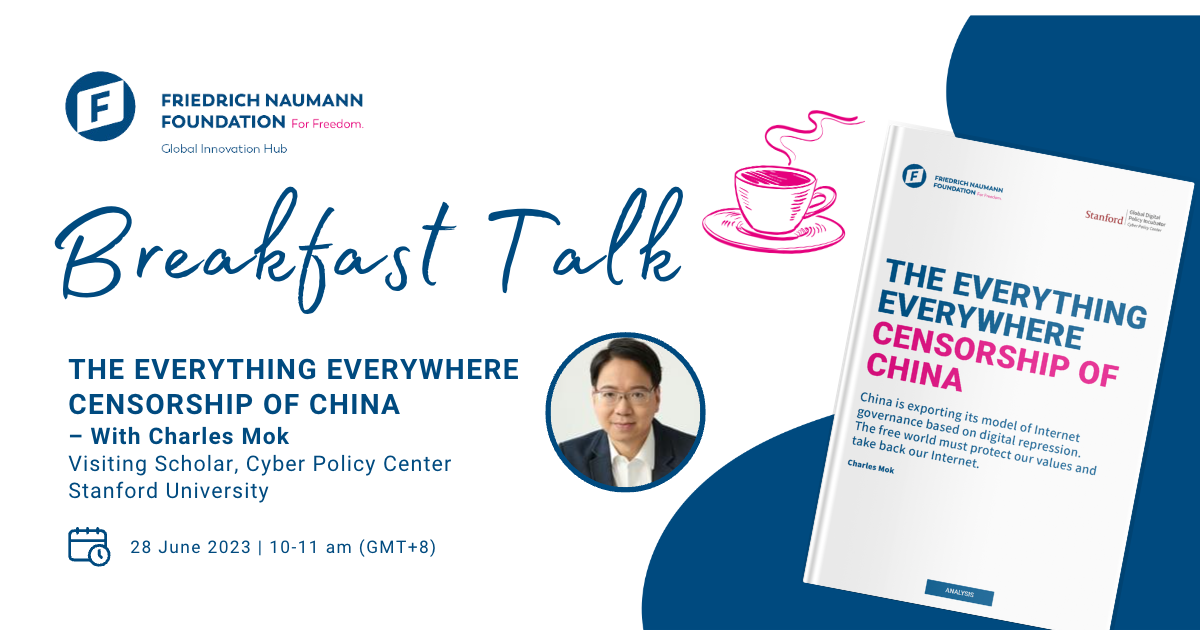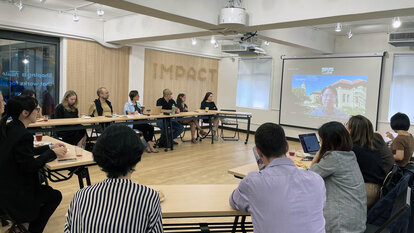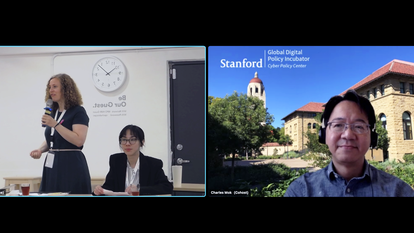Event
Breakfast Talk and Publication Launch with Charles Mok

What better way to foster meaningful conversations and public dialogue on important societal issues than with a traditional Taiwanese breakfast and fresh coffee in an innovative environment? That’s exactly why we gathered at the NPO Hub in Taipei on June 28th, in a space that brings together a diverse range of socially innovative organisations in Taipei for co-creation. Together with our guests from different backgrounds and fields, we learned from Charles Mok’s in-depth research on the publication “The Everything, Everywhere Censorship of China” and shared perspectives on China’s internet governance model – a topic that is constantly developing and thus requires frequent discussion and exchange.

Welcoming the guests at NPO Hub in Taipei
© FNF Global Innovation Hub
Time for a taiwanese breakfast before the event starts
© FNF Global Innovation Hub
Charles talk on his new publication"The Everything, Everywhere Censorship of China"
© FNF Global Innovation Hub
Opening remarks by Anna Marti, Head of FNF Global Innovation Hub
© FNF Global Innovation Hub
Networking time during the event
© FNF Global Innovation HubExploring China’s grand strategy for internet control
What became very clear when Charles Mok, currently a Visiting Scholar at the Cyber Policy Center of Stanford University, started his talk – he knows the internet industry like the back of his hand. Particularly from his entrepreneurial endeavours and contributions to the internet industry. He started in the industry in Hong Kong in the mid 90s when co-founding HKNet, one of the earliest Identity Service Providers in Hong Kong. From this location, he has closely followed all the changes and developments in China’s internet governance over the years. In his publication and presentation, we quickly sensed his fascination with looking at the complex developments that led to the current system. In his publication, Charles Mok closely analyses how China has gradually developed its grand strategy over the years, based on a consistent approach by using different tools – technological, legal, and operational.
The future of the internet should uphold and protect fundamental rights such as freedom of expression, privacy, and access to information. This has always been the main goal of Charles Mok, the author of “The Everything, Everywhere Censorship of China.” His report is one important response to the global challenge of shaping the future of a democratic internet. Furthermore, it is a reminder that, because the internet transcends national boundaries, existing challenges such as cybersecurity, disinformation and censorship are inherently global in nature. Charles Mok mainly emphasises that China’s internet governance differs significantly from the principles of an open and free internet and its governance model, in particular its extensive and sophisticated censorship system, poses a major threat to the free internet that democratic countries advocate for.
We don’t have the vision of one world – one internet anymore. The internet is fragmented.

A successful process of trial and error
One main point of Charles Mok’s talk was that the construction and step by stey building of China's Great Firewall, also known as the Golden Shield Project, involved a trial-and-error process that led to its current sophisticated state. For instance, China's early attempts, like the Green Dam internet filtering system, failed. But "China has learnt its lessons over time and is now doing things more intelligently, so it can now shut down the internet whenever and wherever it wants," the author points out. China has developed new technical standards and internet governance frameworks, and is wrestling away the multi-stakeholder development of its internet industry to gain the highest level of control. Furthermore, the country has developed and exported its own domestic platforms, the most successful are Tencent, WeChat, and TikTok. Charles Mok pointed out that China's grand strategy has global influences. It aims to transnationalise its internet strategy and many authoritarian regimes already follow China’s example.
We have taken the Chinese Great Firewall for granted, as it should be there. I think in that sense the rest of the world has accepted the Chinese internet strategy. They probably thought this is simply their own business. But is that really the case? The problem is maybe that other countries, including the Western democracies, are also learning from China.

Transnationalisation of the Great Firewall
During the Q&A session, the guests were particularly interested in the phenomenon of the CCP’s repressive techniques being exported to other countries. Charles Mok highlighted that the Great Firewall is not something that can be easily exported: "China has been so successful in using the Great Firewall to achieve absolute control because the it started very early and made a consistent effort step by step." Even though it has helped other countries to adopt the model, such as Cambodia with its National Internet Gateway, many of these attempts encountered problems. What makes the Chinese case so outstanding and influential is, as the author emphasises, is that China's internet infrastructure is owned by state-owned companies, which makes it easy to control. According to Charles Mok, almost no other country can replicate China's model of internet governance.
For him, it is key to understand the Chinese internet model in order for to democratic countries to respond strategically and decisively to preserve digital freedom. Charles Mok highlights the need for strategies for defending the free internet, for instance by more research and development of technologies against censorship and for privacy protection.
